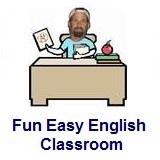|
|
| |
|
|
| |
|
|
| Fun Easy English Classroom June 1 |
|
| |
Classroom
Today
Learn American
English slang
beginning with
letter I |
|

Today in the classroom you are going to learn some slang
beginning with the letter I. |
 Hey
if you cannot understand something on this page, Hey
if you cannot understand something on this page,
then use the Fun Easy English
dictionary
(opens in a new window) |
|
|
|
Slang: American
English Slang - Letter I
Today learn slang beginning with the letter I. |
| Slang |
Definition |
Usage |
| icky |
unpleasant |
The food at this
restaurant is really icky. |
| I.D. |
identification |
Can you show me some
I.D. please? |
| idiot box |
television set |
He always sits in front
of the idiot box and never gets any work
done. |
| in |
fashionable |
The tie you are wearing
is really in. |
| intense |
serious |
This is a very
intense situation we are discussing. |
| ivories |
teeth |
She has really
beautiful ivories. |
|
|
More Slang |
|
 From
YOUR Teacher: Idiot Box From
YOUR Teacher: Idiot Box
This slang refers to a television set since watching TV
can be done without much thought. A person who sits and
watches television for long periods is often referred to
as a couch potato. |
|
|
|
|
|
Additional Lessons |
 About These
Lessons About These
Lessons
The following classroom lessons are great for students
who want additional conversation, listening, and reading
practice. |
-
Conversation Lesson -
Advanced
Level. Dialogs for everyday use.
Short situational dialogs for students of English as
a Foreign (EFL) or Second (ESL) Language with a
written conversation and a conversation notes
section.
|
 Conversation Lesson
4 - Informal Introductions Conversation Lesson
4 - Informal Introductions
(Advanced -
Conversation, Reading)
Dialogs for everyday use. Short situational dialogs for
students of English as a Foreign (EFL) or Second (ESL)
Language. |
Informal Introductions
JIM: Who’s the tall woman next to Barbara?
CHARLES: That’s her friend Mary. Didn’t
you meet her at Steve’s party?
JIM: No, I wasn’t at Steve’s party.
CHARLES: Oh! Then let me introduce you to
her now. Mary, this is my friend Jim.
MARY: Hi, Jim. Nice to meet you.
JIM: You, too. Would you like a drink?
MARY: Sure, let’s go get one. |
|
Conversation Notes |
- “Who’s” is the contracted form of who is. It is
pronounced the same way as “whose” (/ huwz/), but the meaning is different.
- Didn’t you meet her …? Notice that this is a negative
question. Charles thought that Jim had met Mary before. He is now surprised
that Jim does not know Mary, and so he uses a negative question to show his
surprise.
- I wasn’t at Steve’s party. Notice that the emphasis here
is on “at” although prepositions normally have weak stress. In this case,
“at” means “there” (I wasn’t there).
- Mary, this is my friend Jim. This is a friendly way to
introduce two people. It’s common to follow this with “Jim, this is Mary.”
In this case, Mary says “Hi, Jim” first.
- Nice to meet you. This is a typical response after
you’ve been introduced to someone.
- “Sure” is often used in informal conversation to mean
“yes.”
|
|
Source: U.S. State Department |
|
Additional Conversation |
 Conversation Conversation
This is a collection of 30 situational conversations
which focus on a wide variety of communicative and
natural encounters in English....these
lessons are for beginning students. |
 Conversation Conversation
This is a collection of 36 situational conversations
which focus on spoken American English in a relatively
natural way....these
lessons are for intermediate students. |
 Conversation Conversation
English conversation lessons. 52
lessons covering pronunciation, speaking,
writing, and grammar topics....these
lessons are for beginning students. |
 Conversation Conversation
English conversation lessons. 30
lessons focusing mostly on communication and
grammar topics....these
lessons are for intermediate students. |
|
|
|
|
|
|
|
 Hey Students, Hey Students,
Use this dictionary and reference to look up any words you do not
understand in Fun Easy English.
Note: search opens in a new tab. |
|
|
|
|
|
Search Fun Easy English |
|
|
|
|
|
|
|
|
|
|
|
|
|
|
|
About
Contact
Copyright
Resources
Site Map |